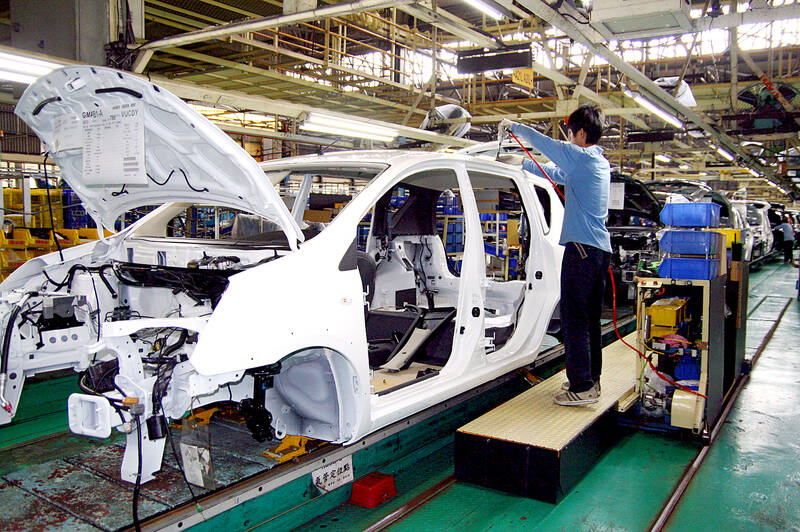Yulon Motor Co (裕隆汽車) yesterday said that total new vehicle sales in Taiwan this year would likely drop below last year’s level as buyers wait on the sidelines amid lingering tariff worries.
Taiwan is conducting tariff negotiations with the US after Washington announced a 90-day pause to “reciprocal” tariffs early last month. Authorities are also under pressure to reduce duties on imported vehicles or scrap commodity taxes on vehicles to ease US concerns.
“We assume the effect of policy changes on the automobile industry should be felt ... but there is no way to predict” their extent, Yulon spokesman Steven Lo (羅文邑) told an online earnings conference.

Photo: CNA
The firm said it would maintain close communications with authorities as the tariff issue weighs on the domestic automobile industry and the tens of thousands of companies in its supply chain.
Last year, total new vehicle sales in Taiwan fell by 4 percent from a year earlier to 457,837 units after growing 12 percent annually to 477,009 units in 2023, government data showed.
Regarding exchange rate fluctuations, every NT$1 change would affect Yulon’s revenue by about NT$60 million (US$1.99 million), but the overall impact on the company’s operating income is not significant, as Yulon could pass on cost changes in material procurement to downstream suppliers, Lo said.
However, with the absence of clear policy support, market sentiment remains conservative and the company expects overall vehicle sales in Taiwan this year to fall below 450,000 units.
Yulon’s downbeat forecast came as sales of new vehicles in Taiwan in the first four months of the year dropped 11.4 percent annually to 132,733 units.
The weakening demand in the domestic market led the company to report consolidated revenue of NT$17.59 billion in the first quarter, down 15.24 percent from the same period a year earlier.
Faced with falling sales and lower investment income, Yulon said net profit in the first quarter fell 49.7 percent year-on-year to NT$436 million, or earnings per share of NT$0.42.
The company, which has a long-term partnership with Nissan Motor Co, said it is paying close attention to the Japanese automaker’s organizational adjustments and overseas factory closures, but added that Nissan’s Taiwanese supply system is still operating normally.
On a positive note, Yulon is to manufacture electric vehicles (EVs) in Taiwan for Mitsubishi Motors Corp based on a model developed by Foxtron Vehicle Technologies Co (鴻華先進), its joint venture with Hon Hai Precision Industry Co (鴻海精密).
Yulon plans to start shipping its first EV model for Mitsubishi to the New Zealand and Australian markets next year, it said.
As for domestic EV sales, insufficient EV infrastructure has capped the growth of its Luxgen models, with sales down 10 percent to 1,391 units in the first four months.

SETBACK: Apple’s India iPhone push has been disrupted after Foxconn recalled hundreds of Chinese engineers, amid Beijing’s attempts to curb tech transfers Apple Inc assembly partner Hon Hai Precision Industry Co (鴻海精密), also known internationally as Foxconn Technology Group (富士康科技集團), has recalled about 300 Chinese engineers from a factory in India, the latest setback for the iPhone maker’s push to rapidly expand in the country. The extraction of Chinese workers from the factory of Yuzhan Technology (India) Private Ltd, a Hon Hai component unit, in southern Tamil Nadu state, is the second such move in a few months. The company has started flying in Taiwanese engineers to replace staff leaving, people familiar with the matter said, asking not to be named, as the

The prices of gasoline and diesel at domestic fuel stations are to rise NT$0.1 and NT$0.4 per liter this week respectively, after international crude oil prices rose last week, CPC Corp, Taiwan (台灣中油) and Formosa Petrochemical Corp (台塑石化) announced yesterday. Effective today, gasoline prices at CPC and Formosa stations are to rise to NT$27.3, NT$28.8 and NT$30.8 per liter for 92, 95 and 98-octane unleaded gasoline respectively, the companies said in separate statements. The price of premium diesel is to rise to NT$26.2 per liter at CPC stations and NT$26 at Formosa pumps, they said. The announcements came after international crude oil prices

DOLLAR SIGNS: The central bank rejected claims that the NT dollar had appreciated 10 percentage points more than the yen or the won against the greenback The New Taiwan dollar yesterday fell for a sixth day to its weakest level in three months, driven by equity-related outflows and reactions to an economics official’s exchange rate remarks. The NT dollar slid NT$0.197, or 0.65 percent, to close at NT$30.505 per US dollar, central bank data showed. The local currency has depreciated 1.97 percent so far this month, ranking as the weakest performer among Asian currencies. Dealers attributed the retreat to foreign investors wiring capital gains and dividends abroad after taking profit in local shares. They also pointed to reports that Washington might consider taking equity stakes in chipmakers, including Taiwan Semiconductor

A German company is putting used electric vehicle batteries to new use by stacking them into fridge-size units that homes and businesses can use to store their excess solar and wind energy. This week, the company Voltfang — which means “catching volts” — opened its first industrial site in Aachen, Germany, near the Belgian and Dutch borders. With about 100 staff, Voltfang says it is the biggest facility of its kind in Europe in the budding sector of refurbishing lithium-ion batteries. Its CEO David Oudsandji hopes it would help Europe’s biggest economy ween itself off fossil fuels and increasingly rely on climate-friendly renewables. While